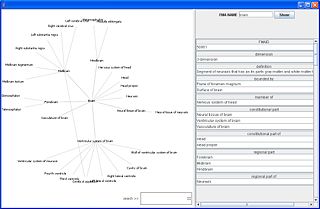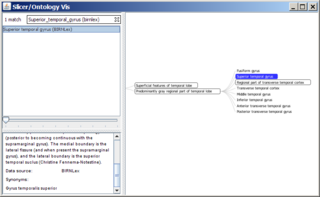Difference between revisions of "FMA (Protege) links to Slicer"
From NAMIC Wiki
Aviswanath (talk | contribs) |
|||
| (15 intermediate revisions by 3 users not shown) | |||
| Line 1: | Line 1: | ||
{| | {| | ||
|[[Image:Fma.JPG|thumb|320px|Exploration of Foundational Model of Anatomy's representation of brain ]] | |[[Image:Fma.JPG|thumb|320px|Exploration of Foundational Model of Anatomy's representation of brain ]] | ||
| − | |[[Image:SmallOntologyBrowser.png|thumb|320px| | + | |[[Image:SmallOntologyBrowser.png|thumb|320px|SPN Ontology visualization in Query Atlas.]] |
|} | |} | ||
| Line 8: | Line 8: | ||
__NOTOC__ | __NOTOC__ | ||
| − | + | ||
| − | |||
| − | |||
| − | |||
| − | |||
| − | |||
===Key Investigators=== | ===Key Investigators=== | ||
| − | * | + | * GE: Viswanath Avasarala, Jim Miller |
| − | * | + | * Harvard: Ion-Florin Talos, Michael Halle, Wendy Plesniak |
| + | * Isomics: Steve Pieper | ||
| Line 25: | Line 21: | ||
<h1>Objective</h1> | <h1>Objective</h1> | ||
| − | We are | + | |
| + | We are building algorithms to browse Protege's frame based ontologies. This capability will allow us to integrate some very extensive anatomy ontologies like the Foundational Model of Anatomy into Slicer3. Also, we plan to develop reasoning algorithms to work with functional ontologies of brain based on Protege's frame based representation. | ||
| Line 33: | Line 30: | ||
<h1>Approach, Plan</h1> | <h1>Approach, Plan</h1> | ||
| + | Based on the idea's presented in the paper, "OQAFMA Querying Agent for the Foundational Model of Anatomy", we will build | ||
| + | a query-engine that allows a software program to navigate through Protege ontologies. We will use this capability to develop an ontology browser for FMA. | ||
| + | |||
| − | |||
| − | |||
</div> | </div> | ||
| Line 42: | Line 40: | ||
<h1>Progress</h1> | <h1>Progress</h1> | ||
| + | During the Na-Mic week | ||
| + | # Normalized concepts of Freesurfer, BIRNLEX,Neuro-Names and FMA. | ||
| + | # Finalized the design of reasonig system that will work the functional ontology. | ||
| + | # Stared working on integrating FMA explorer to QueryAtlas. | ||
| + | |||
| + | |||
| + | </div> | ||
| + | |||
| + | |||
| + | <div style="width: 40%; float: left;"> | ||
| + | |||
| + | <h1>Future work</h1> | ||
| − | + | # Integrate FMA explorer to Query Altas | |
| + | # Complete the design of ontology reasoner for the Motor cortex's functional ontology. | ||
</div> | </div> | ||
| + | |||
<br style="clear: both;" /> | <br style="clear: both;" /> | ||
</div> | </div> | ||
| − | |||
===References=== | ===References=== | ||
| − | * A | + | * Talos I, Rubin D, Halle M, Musen M, Kikinis R. A prototype symbolic model of canonical functional neuroanatomy of the motor system. J Biomed Inform. 2008 Apr;41(2):251-263. |
| − | *C. Rosse and J.L.V. Mejino, A reference ontology for biomedical informatics: the Foundational Model of Anatomy. J. Biomed Inform. 36:478-500, 2003. | + | * C. Rosse and J.L.V. Mejino, A reference ontology for biomedical informatics: the Foundational Model of Anatomy. J. Biomed Inform. 36:478-500, 2003. |
| − | *P. Mork, J.F. Brinkley, and C. Rosse, OQAFMA querying agent for the Foundational Model of Anatomy: providing flexible and efficient access to a large semantic network. J. Biomed Inform. 36:501-517, 2003. | + | * P. Mork, J.F. Brinkley, and C. Rosse, OQAFMA querying agent for the Foundational Model of Anatomy: providing flexible and efficient access to a large semantic network. J. Biomed Inform. 36:501-517, 2003. |
* Talos I, Rubin D, Halle M, Musen M, Kikinis R. A prototype symbolic model of canonical functional neuroanatomy of the motor system. J Biomed Inform. 2008 Apr;41(2):251-263. | * Talos I, Rubin D, Halle M, Musen M, Kikinis R. A prototype symbolic model of canonical functional neuroanatomy of the motor system. J Biomed Inform. 2008 Apr;41(2):251-263. | ||
Latest revision as of 14:49, 27 June 2008
Home < FMA (Protege) links to Slicer
Key Investigators
- GE: Viswanath Avasarala, Jim Miller
- Harvard: Ion-Florin Talos, Michael Halle, Wendy Plesniak
- Isomics: Steve Pieper
Objective
We are building algorithms to browse Protege's frame based ontologies. This capability will allow us to integrate some very extensive anatomy ontologies like the Foundational Model of Anatomy into Slicer3. Also, we plan to develop reasoning algorithms to work with functional ontologies of brain based on Protege's frame based representation.
Approach, Plan
Based on the idea's presented in the paper, "OQAFMA Querying Agent for the Foundational Model of Anatomy", we will build a query-engine that allows a software program to navigate through Protege ontologies. We will use this capability to develop an ontology browser for FMA.
Progress
During the Na-Mic week
- Normalized concepts of Freesurfer, BIRNLEX,Neuro-Names and FMA.
- Finalized the design of reasonig system that will work the functional ontology.
- Stared working on integrating FMA explorer to QueryAtlas.
Future work
- Integrate FMA explorer to Query Altas
- Complete the design of ontology reasoner for the Motor cortex's functional ontology.
References
- Talos I, Rubin D, Halle M, Musen M, Kikinis R. A prototype symbolic model of canonical functional neuroanatomy of the motor system. J Biomed Inform. 2008 Apr;41(2):251-263.
- C. Rosse and J.L.V. Mejino, A reference ontology for biomedical informatics: the Foundational Model of Anatomy. J. Biomed Inform. 36:478-500, 2003.
- P. Mork, J.F. Brinkley, and C. Rosse, OQAFMA querying agent for the Foundational Model of Anatomy: providing flexible and efficient access to a large semantic network. J. Biomed Inform. 36:501-517, 2003.
- Talos I, Rubin D, Halle M, Musen M, Kikinis R. A prototype symbolic model of canonical functional neuroanatomy of the motor system. J Biomed Inform. 2008 Apr;41(2):251-263.

